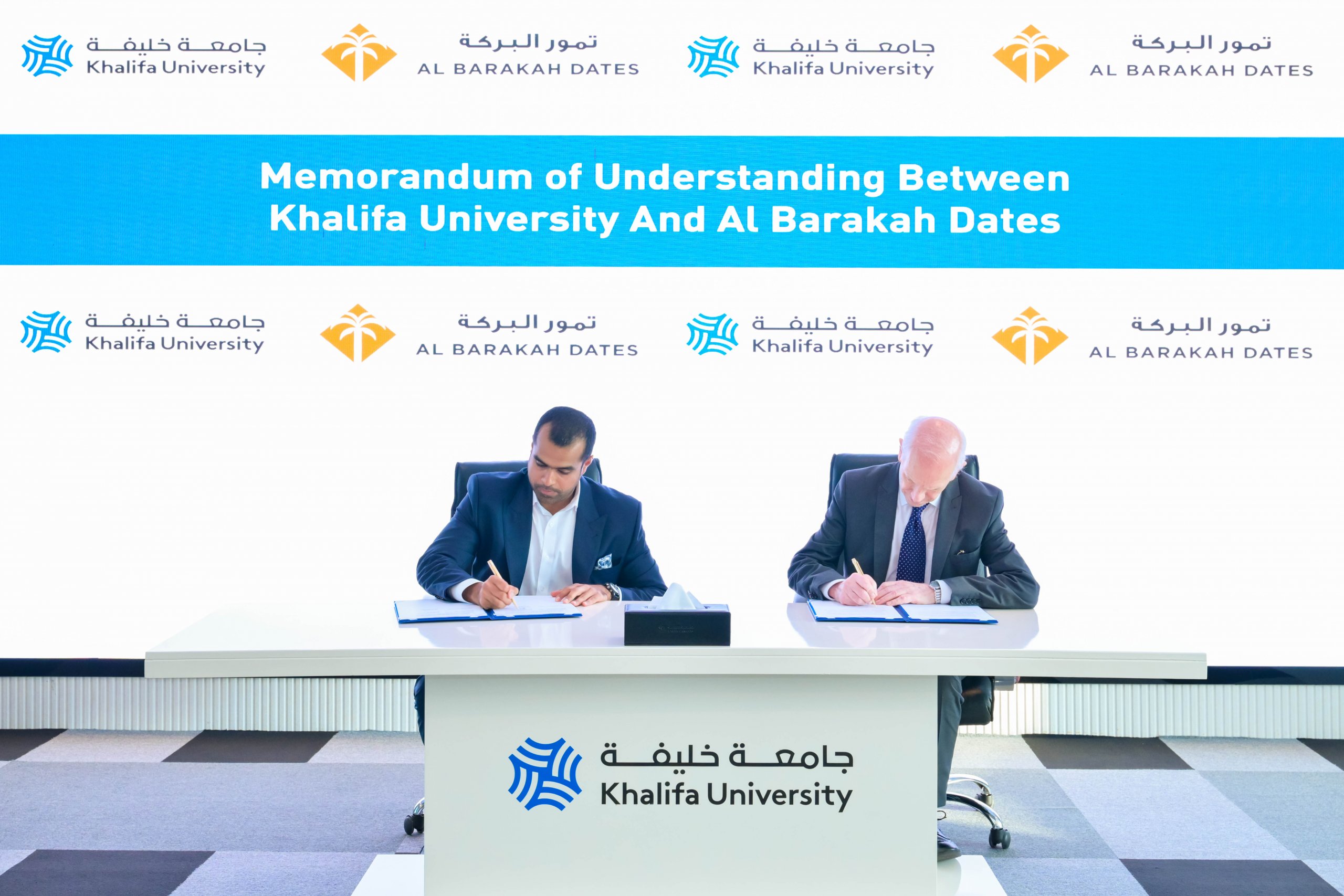
Leveraging Scientific Advancements and Market Insights, the Agreement Drives Sustainable Innovation in the UAE Date Industry
Khalifa University of Science and Technology and UAE’s leading dates packaging and processing company Al Barakah Dates Factory today announced they have signed a collaboration agreement to support research and development activities, and industrial projects, focusing on date seed oil extraction and related areas. The partnership will leverage Khalifa University’s cutting-edge research and scientific innovations, as well as Al Barakah Dates Factory’s global market presence to transform the date palm industry in the UAE.
A Memorandum of Understanding (MoU) was signed by Professor Sir John O’Reilly, President, Khalifa University, and Yousuf Saleem, Managing Director, Al Barakah Dates, during a ceremony at Khalifa University’s Main Campus. The MoU signing was attended by H.E. Homaid Al Shimmari, Vice Chairman of the Board of Trustees of Khalifa University, and members of the Khalifa University senior management.
Professor Sir John O’Reilly, President, Khalifa University said: “Khalifa University’s collaboration with Al Barakah Dates represents a significant step forward in our commitment to sustainable and innovative solutions for the dates industry. By combining Khalifa University’s research expertise with Al Barakah’s industry track record, we aim to drive innovation and make a positive impact in the field and explore new avenues to help contribute to the UAE’s sustainable growth.
Yousuf Saleem, Managing Director, Al Barakah Dates Factory said: “This partnership with Khalifa University is a groundbreaking step for Al Barakah Dates, integrating academic research with industrial application. Our goal is to advance the date seed oil extraction process, making it more efficient and sustainable, thereby opening new markets and applications for this valuable resource. We are excited to see the fruits of this collaboration, which will not only benefit the UAE but also the global dates industry.”
Al Barakah Dates processes over 85,000 tonnes of dates and date products annually, equivalent to almost half of the UAE’s entire domestic harvest, contributing to the country’s growing food and agriculture sector. The company also supports global decarbonization efforts with more than 6,500 solar panels at its sustainable facility that offsets 3,000 tonnes emissions per year.
Khalifa University has been actively exploring innovative methods to maximize the potential of date seeds and harness their numerous benefits. Over the years, researchers at Khalifa University have successfully developed multiple processes that can transform date tree waste into valuable products. One significant achievement of their research is the creation of an extraordinary material that combines graphene with sand. This hybrid material has proven to be highly effective in absorbing pollutants from industrial wastewater, making it an environmentally friendly solution for wastewater decontamination. In fact, its adsorption capacity surpasses that of other graphene-based adsorbents, making it a scalable and efficient option.
In addition, the Khalifa University team has made significant strides in another research project. By combining activated carbon derived from date seeds with a nitrogen-containing compound known as polyaniline, they have developed electrodes that offer a sustainable method for the recovery and reuse of metal ions from mining industry wastewater. This process employs the innovative capacitive deionization (CDI) technique.
Furthermore, Khalifa University has achieved significant progress in producing electrodes and catalysts using activated carbon derived from date seeds. These electrodes are essential in the process of converting bio-oil into useful fuels and other value-added products. This innovative research demonstrates that waste can be transformed into valuable resources, thereby contributing to a more sustainable future.
Alisha Roy
Science Writer
23 January 2024